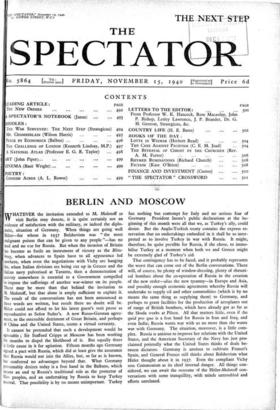BERLIN AND MOSCOW
ATHATEVER the invitation extended to M. Molotoff to visit Berlin may denote, it is quite certainly not an evidence of satisfaction with the military, or indeed the diplo- matic, situation of Germany. When things are going well Hitler—for whom in 1937 Bolshevism was "the most malignant poison that can be given to any people "—has no need and no use for Russia. But when the invasion of Britain has become as futile an instrument of victory as the Blitz- krieg, when advances to Spain have to all appearance led nowhere, when even the negotiations with Vichy are hanging fire, when Italian divisions are being cut up in Greece and the Italian navy pulverised at Taranto, then a demonstration of activity somewhere is essential to a Government compelled to impose the sufferings of another war-winter on its people. There may be more than that behind the invitation to M. Molotoff, but that alone is amply sufficient to explain it. The result of the conversations has not been announced as these words are written, but result there no doubt will be. Hitler could not afford to let his latest guest's visit prove as unproductive as Senor Sulier's. A new Russo-German agree- ment, to the ostensible detriment of Great Britain, and perhaps of China and the United States, seems a virtual certainty.
It cannot be pretended that such a development would be agreeable ; Sir Stafford Cripps at Moscow has been working for months to dispel the likelihood of it. But equally there is little cause in it for agitation. Fifteen months ago Germany Signed a pact with Russia, which did at least give the assurance that Russia would not join the Allies, but, so far as is known, has conferred no advantages beyond that. What Germany Presumably desires today is a free hand in the Balkans, which means an end t9 Russia's traditional role as the protector of Slav peoples, and an undertaking by Russia to keep Turkey neutral. That possibility is by no means unimportant. Turkey has nothing but contempt for Italy and no serious fear of Germany President Inonu's public declarations at the be- ginning of this month were all that we, as Turkey's ally, could desire. But the Anglo-Turkish treaty contains the express re- servation that no undertakings embodied in it shall be so inter- preted as to involve Turkey in war with Russia. It might, therefore, be quite possible for Russia, if she chose, to immo- bilise Turkey at a moment when both we and Greece might be extremely glad of Turkey's aid.
That contingency has to be faced, and it probably represents the worst that can come out of the Berlin conversations. There will, of course, be plenty of window-dressing, plenty of rhetori- cal bombast about the co-operation of Russia in the creation of the new order—alias the new tyranny—in Europe and Asia, and possibly enough economic agreements whereby Russia will undertake to supply oil and other commodities (which is by no means the same thing as supplying them) to Germany, and perhaps to grant facilities for the production of aeroplanes out of range of "British bombers, which have already got as far as the Skoda works at Pilsen. All that matters little, even if the quid pro quo is a free hand for Russia in Iran and Iraq, and even India; Russia wants war with us no more than she wants war with Germany. The situation, moreover, is a little com- plex. Russia is anxious to improve her relations with the United States, and the American Secretary of the Navy has just pro- claimed pointedly what the United States thinks of deals be- tween dictators. Germany is anxious to cultivate Franco's Spain, and General Franco still thinks about Bolshevism what Hitler thought about it in 1937. Even the compliant Vichy sees Communism as its chief internal danger. All things con- sidered, we can await the outcome of the Hitler-Molotoff con- versations with some tranquillity, with minds untroubled and efforts unrelaxed.


























